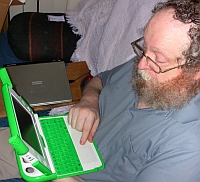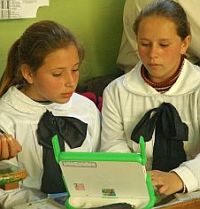
Ed Cherlin in OLPC action
OLPC aims to add several percent to annual economic growth in the developing countries, with spillovers to the developed countries that will have the opportunity to supply technology and we don't even know what else. (This is not officially stated, but I infer it from the goal of ending poverty. If anybody wants, I can run the numbers in a future article.)
The XO will provide more access to health information than we could dream of a few years ago. Of course, we don't yet know who will make that information available in local languages, nor who will access what parts of it and put it to use. The XO will let the children and their communities talk together all over the world, if they want to, and who knows what that might lead to?
XO Collaboration
But today, I am voting for a different aspect of the program as potentially the most astonishing. The XO laptop software is set up for collaboration. Several children can sign on to the same instance of a Sugar activity, including paint, music, write, browse, and program. In some cases, many children--entire classrooms or entire schools. And there are games, of course. There have been several two-player games in various XO software builds, including a Tetris clone. Whenever you complete a line of blocks, so that it disappears from your screen, your opponent's game speeds up.
Anyway, we have seen other collaborative applications here and there, such as Google Documents. Several people can edit a spreadsheet or other document online at the same time. Before that, we had features such as Track Changes and Merge Changes in Microsoft Word and other ways to share edits in other software. The idea has been in the air for a long time, and there is no doubt that we will see much more of it.
Collaboration as Cheating
The problem for collaboration on the XO in schools is that in many educational systems, "collaboration" is defined as "cheating". Children do it anyway, at every level from that defined as innocuous, like asking for help understanding the textbook, to getting someone else to write your papers, or in the worst case buying papers from the Internet.
See the Harry Potter books for examples of British schoolchildren's point of view on the issue. Harry and Ron write horrible drafts for their assignments, and Hermione cleans them up, substantially rewriting a lot of what they give her. But she won't write papers for them from scratch.
The problem with treating collaboration as cheating is that collaboration is precisely what children need to learn in order to succeed in business, science, government or anything else when they grow up and leave school.
Many people in the visual arts, music, and literature can create solo, but they need partners to handle many other functions, including the business side of arranging concerts, selling original works, or publishing. In fact, just about everybody needs a vast multitude of people doing interconnected parts of the work of the world. This is why Adam Smith began his classic work, "An Inquiry into the Nature and Causes of the Wealth of Nations" with an account of the division of labor in a pin factory, and made the claim that the division of labor is the foundation of all wealth in civilized societies.
Collaboration Discussion
So what are we going to do about collaboration as cheating? Not a lot, actually, other than perhaps facilitating the discussion. This is going to be an issue between students, teachers, families, and society in many countries. We can't tell them what they want to do. Those of us who have factual information about what works, including historical insight, will be able to make a few useful suggestions (like reading Adam Smith rather than what lesser thinkers say about him), while the usual armchair analysts will pontificate as always.
As H. L. Mencken observed, "For every problem there is a solution which is simple, obvious--and wrong." My money is on the children. Where's yours?



I agree with you on the fine line between collaberation and cheating. I teach special education in a self-contained class on the high school level. All of my students have severe cognative disabilities. I always tell my students to use all of the resources available to them when they do their work. I give them "cheat sheets" with word banks, math formulas, hints and the like. My classroom walls are covered with all sorts of "hint" posters and word walls, etc. And I am tolerant of students using the resource of looking on their neighbor's paper. Often the student knows the correct answer, but is unsure of himself. By looking over to see what his neighbor has written, he is self-checking and reassuring himself that he has the correct answer. (Of course there are times when I have to give tests and such that I have the students cover their papers and don't allow looking on neighbor's paper.) Often we do assignments together and I ask the students for the correct answer. When someone gives an answer, I ask the rest of the class to vote if they agree with the answer. I don't tell them if they are right or wrong, but usually they figure out the correct answer when they have to vote on it. Some times we play "Prove Your Point." I ask a question and the student has to give the answer and then when we vote, if even one person disagrees, they have to "prove the point" by giving a reference from the text. Often they get into a lively discussion about the answer, reading and rereading paragraphs, trying to prove their answer. Finally, someone figures it out and the "point is proven."
My students work together to create Power Point presentations and art projects. We do collaberative reports with each student taking part in the creation and presentation. We do very little individual work in my class. And even though my students are very low in cognitive skills, they have tackeled and learned many complex, high school level subjects. For instance we recently completed a unit on the structure and function of DNA. We culminated the unit with the construction of a 20 foot long paper model of DNA. Every student did a little bit of the model. They loved DNA!
I would very much love to have a bunch of XO computers in my classroom. I can think of so many projects that I could put my kids to work on. We manage pretty well on the old clunker, hand-me-down desk top computers that we have. But the idea of every child in the room having his or her very own laptop and having real ownership in it is great. And the ability to mesh network and collaberate on games and projects is just limitless in possibilities.
Where will the local language health info come from?
Probably from Wikipedians.
In parallel with their encyclopedias in over 100 languages the Wikimedia foundation has already set up the wikibooks project.
Wikibooks aims to create textbooks in every language. They have had mixed progress so far - programming books in english are probably the most advanced (no surprise) - but the infrastructure is there now. Not just the software and disk space but the teams of editors and moderators in every language on earth, experienced in collaboration.
As more helpers appear more progress will be made and this will then attract more helpers.